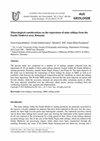具有异质品味、不同技术和内生财富的Heckscher-Ohlin和Oniki-Uzawa贸易模型的综合
Q4 Mathematics
Analele Stiintifice Ale Universitatii Al I Cuza Din Iasi - Matematica
Pub Date : 2015-11-01
DOI:10.1515/aicue-2015-0027
引用次数: 5
摘要
摘要本文考察了在改革后的H-O国际贸易模型中,两国之间的偏好和技术差异在决定全球财富动态和贸易模式中的作用。本文构建了完全竞争市场和自由贸易条件下,具有内生财富积累和部门间、国家间劳动资本分配的贸易模型。该模型基于H-O模型、索洛-乌泽新古典增长模型和Oniki-Uzawa贸易模型。每个国家都有三个部门,生产一种全球同质的可贸易资本品,指定生产一种可贸易商品,以及提供非可贸易商品和服务。本文对该模型进行了经济模拟,证明了平衡点的存在性和动态系统的运动性。它考察了工业部门的产出弹性变化、人口扩张以及消费国内商品、消费其他国家商品、消费服务和持有财富的倾向的影响。本文章由计算机程序翻译,如有差异,请以英文原文为准。
A Synthesis of the Heckscher-Ohlin and Oniki-Uzawa Trade Models with Heterogeneous Tastes, Different Technologies, and Endogenous Wealth
Abstract This paper examines the role of preferences and technological differences between two countries in determining dynamics of global wealth and pattern of trade in a reformed H-O model of international trade. The paper builds a trade model with endogenous wealth accumulation and labor and capital distribution between sectors and between countries under perfectly competitive markets and free trade. The model is based the H-O model, the Solow-Uzawa neoclassical growth model and the Oniki-Uzawa trade model. Each country has three sectors, producing one globally homogenous tradable capital good, specifying in producing one-tradable commodity, and supplying non-tradable goods and services. The study simulates the model for the economy to demonstrate existence of equilibrium points and motion of the dynamic system. It examines effects of changes in output elasticity of an industrial sector, population expansion, and propensities to consume the domestic commodity, to consume the other country’s commodity, to consume services, and to hold wealth.
求助全文
通过发布文献求助,成功后即可免费获取论文全文。
去求助
来源期刊
CiteScore
0.70
自引率
0.00%
发文量
2
审稿时长
>12 weeks
期刊介绍:
This journal is devoted to the publication of original papers of moderate length addressed to a broad mathematical audience. It publishes results of original research and research-expository papers in all fields of mathematics.

 求助内容:
求助内容: 应助结果提醒方式:
应助结果提醒方式:


